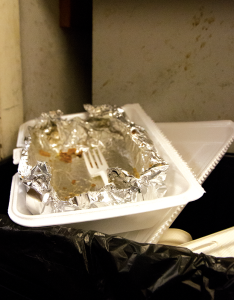
Businesses like Mai Thai would be affected by a ban.
Mayor Vincent Gray’s legislative push for sustainability, proposed to the District of Columbia Council on Oct. 1, would ban all Styrofoam food containers in the District beginning in January 2018.
The Sustainable D.C. Legislative Package of 2013, composed of eight bills, would require seven votes of 13 to pass. A date for the vote has not yet been set, and the other bills serve to encourage public transit and alternative fuels and energy sources, to amend the District’s tree-replacement program and to create a youth environmental literacy program, among other things.
The Anacostia Pollution Prevention Act of 2013 seeks to ban all food containers, plates, hot and cold beverage cups, meat and vegetable trays and egg cartons made of expanded polystyrene, or Styrofoam and would be applicable to all businesses that sell or provide food for consumption. It also encourages the use of compostable or recyclable containers.
Environmental rights activists argue that, while polystyrene is generally inexpensive and more insulating than paper, it is difficult to recycle, minimally biodegradable and often ends up in waterways. According to Anacostia Watershed Society President James Foster, the Anacostia River is currently not safe for swimming or fishing due to the high amount of waste and pollution affecting its waters. Currently, Styrofoam accounts for 30 percent of trash caught in the river, and beverage containers make up 40 percent.
Gray is seeking to reduce the amount of waste in the river, which is measured through a trash trap set up on one of the river’s tributaries.
“We’ll see a debate, we’ll see a discussion, and you know, the plastic bag manufacturers and the Styrofoam container manufacturers will push back because, you know, it’s their livelihood,” Foster said. “I hate that we have to take this route, but people aren’t taking personal responsibility for the disposal of some of these materials, and they’re ending up in my river, the Anacostia.”
If the D.C. Council were to pass the legislation, the District would join Seattle and several California and East Coast cities, including Brookline, Mass., and San Jose, Calif., in enforcing such a policy.
Philadelphia, New York, Chicago and Boston, among others, are also currently discussing similar measures.
The legislation would, however, affect several local businesses, including Mai Thai, which would need to reevaluate its packaging.
According to Mai Thai Manager Lloyd Angus, the restaurant’s four highest-selling dishes, which include pad thai, drunken noodle and several appetizers, use Styrofoam packaging. Other forms of possible packaging materials include plastic, banana leaves and foil.
“Plastic packaging is a little more expensive, so we would have to budget in for that,” Angus said.
According to an American Chemistry Council report conducted for New York’s proposed ban, for every $1 currently spent on Styrofoam containers, businesses would have to spend at least $1.94 on alternatives.
In a document prepared for the D.C. Council, D.C. Chief Financial Officer Natwar Gandhi presented similar findings, particularly concerning the financial impact on the D.C. public school system, the Department of Corrections, the public charter school system and the Department of Youth Rehabilitation Services. According to Gandhi, banning Styrofoam could drive up the cost of the public school system food service contract by $400,000, and other contracts would be similarly affected.
Nevertheless, Gandhi stressed that the economic effect could be easily absorbed by the D.C. Department of Environment’s existing resources.
The bill will not, however, highly impact university operations, which does not currently utilize Styrofoam in Grab ‘n’ Go or Epicurean and Co.
“From an environmental standpoint, we are already out ahead on this topic,” Office of Sustainability Program Coordinator for Sustainability Audrey Stewart said.














